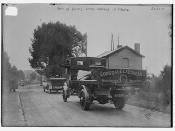In 2003, thirty years after Britain became a membership of the European Communities, it is still considered as Europe's "awkward partner". Where does it come from? European communities were created because the founding fathers of the union believed that integrating European countries' economies would link them in order to preserve peace between them and that this economic integration would one day lead to political integration. The other objective was to create a huge European market which would match the American one in size and scale. In 1950, Robert Schuman proposed the pooling of French and West German supplies of coal and steal, and invited the other European states that whished to associate themselves to the experiment. But Britain was yet involved in the formation of the Organization for Economic Co-operation and Development (OECD) and the North Atlantic Treaty Organization (NATO). And there was opposition from the Commonwealth "who believed that British membership would work against the Commonwealth economic and political relationship" [George, S.;
1998]. British argued that the United Kingdom's economic and political interests were worldwide and a European common market would be contrary to the approach of free trade and payments. It would also involve the removal of protection for British industry against European competition. Moreover, Britain did not want to lose its sovereignty for this supranational integration and preferred to be careful and wait to see if this experiment would work. For these reasons Britain decided not to join the European Coal and Steal Community (ECSC) despite being subjected to strong American pressure favoring European integration. This resistant situation was to persist into the 1960s, when Britain finally came to apply for membership of the Communities. As Miriam Camps says in her study of the period from 1955 to 1963, "the British Government had lost the initiative and...



Repetive
Ideas are repeated instead of developed.
Awkward.
1 out of 1 people found this comment useful.